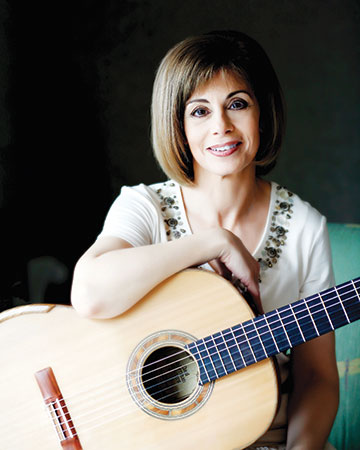Next story: Round 4, Week 1: Chester Copperpot vs. The Spin Wires
Making Arrangements
by Jan Jezioro

The Buffalo Chamber Players arrange things differently
If there is one thing that you can count on, it’s that the Buffalo Chamber Players will find a new way to do things just a little differently, as in their next concert on Wednesday, April 23 at 7:30pm at the Buffalo Seminary on Bidwell Parkway, which will consist entirely of transcriptions and arrangements.
JoAnn Falletta will be the guitarist in Schubert’s Quartet for Flute, Guitar, Viola, and Cello in G Major, an unfinished work for which she reworked the viola part and wrote a new cello part in the style of the composer. Schubert’s work reflects the flowering of interest in the guitar in Vienna at the beginning of the 19th century, spurred on in part by the presence in that city of Mauro Giuliani, the greatest guitarist of the era. It is based on the Notturno for Flute, Viola and Guitar by Wenzeslaus Matiegka (1773-1830), who has been described as “the Beethoven of the guitar.”
Roland Martin continues to be one of the busiest musicians on the local classical music scene, but when Janz Castelo asked him to arrange the famous “Adagietto” movement from Mahler’s Symphony No. 5, he found the invitation irresistible. “I made my arrangement for string quartet, adding string bass, guitar, and harmonium,” says Martin. “I transcribed the music written for the harp in Mahler’s symphonic score into a guitar part, which JoAnn Falletta will perform, and the harmonium and string bass will be used to fill in the sustained lower line of the orchestra.”
Buffalo-based composer Caroline Mallonée was inspired to compose her song cycle Falling, which will feature baritone James Wright, by a Willie Nelson song, “I’m Falling in Love Again.”
“A band mate of mine shared the song with me,” says Mallonée, “and we agreed it was as much an art song as a country song. I decided to pair it with ‘Im wunderschönen Monat Mai’ from Schumann’s Dichterliebe because of the falling gestures and the piano texture, to which the Nelson guitar part is similar. I wanted to include something very old and something very new to suggest that the human condition of falling in love, being in love, aching to love, is timeless, as are falling lines and chromatic shifts in harmony. ‘Moro, Lasso,’ a very famous 1611 motet by Gesualdo, opens with one of the most surprising and wrenching chord progressions of all time. Originally for five voices a cappella, not solo voice and accompaniment, the motet is longer than the others and very contrapuntal. I’ve also included ‘Two, Diverging,’ a short song of mine from 2007 about two people who are walking away from each other but wish they weren’t. These aren’t arrangements so much as orchestrations. I changed very little in terms of the harmony and accompaniment in these pieces as I consider myself a bit of a curator in this instance since I wanted to create a cycle that highlighted the similarities of these songs. I hope the listener will hear the connections, both in the vocal lines and in the texts, and in how the instruments are used underneath.”
A mezzo soprano and a violist, good friends of Fredonia-based composer Rob Deemer, asked him to set an Edgar Allen Poe poem for them to perform at their wedding. “A year later,” Deemer says, “I wrote another Poe setting for the same couple to perform at my own wedding, and a year after that, a mutual friend of ours commissioned yet a third setting, this time of a Robert Burns poem for her wedding. The original settings of all three works have been performed as a concert piece. When Janz mentioned that he was putting together a concert of arrangements, I decided to re-set the work for him to perform on the viola along with English horn virtuoso Anna Mattix.”
In 1875 Tchaikovsky received a commission from a St. Petersburg magazine publisher to provide one piano piece monthly for a year. All 12 pieces were later published under the title of The Seasons. The 20th-century Japanese composer Toru Takemitsu’s arrangement of the October selection follows the piano piece closely, with the clarinet playing most of the main melody.
A transcription by Arnold Schoenberg will also be on the program. It may come as a surprise to some to learn that Schoenberg, the 20th century’s modernist composer par excellence, had a genuine devotion to the music of the waltz king, Johann Strauss. In the stressed economic situation of post World War I Vienna, his Society for Private Musical Performances hosted concerts where audience members paid only what they could afford and critics were not allowed. Schoenberg transcribed his version of Strauss’s Emperor Waltz for string quartet, flute, clarinet, and piano, for one of the society’s 1925 concerts.
Tickets are $15, $5 for students. Visit www.buffalochamberplayers.org.
blog comments powered by Disqus|
Issue Navigation> Issue Index > v13n16 (Week of Thursday, April 17) > Making Arrangements This Week's Issue • Artvoice Daily • Artvoice TV • Events Calendar • Classifieds |









 Current Issue
Current Issue